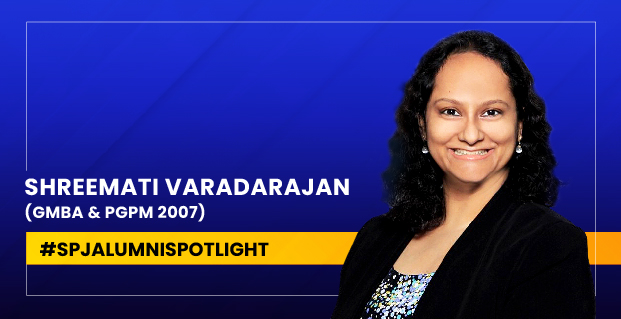HOW SOCIETY BENEFITS FROM FIERCE WOMEN FINANCIAL ADVISORS – SPJ ALUMNI SPOTLIGHT WITH SHREEMATI VARADARAJAN
“Women’s share in wealth rose considerably over the 20th century, and today they hold around 40% of global wealth. Women financial advisors can bring a different perspective and use our evolutionary advantage to be more empathetic to understand the needs and wants of our clients. As societies change and evolve, more and more women are starting to enter the professional space, especially in the financial services industry. Early financial education plays a significant part in this and has been one of my biggest passions.”

Shreemati Varadarajan (GMBA & PGPM 2007) has established herself as one of the prominent professionals in the Financial Advisory industry. Accredited with a strong academic record and an analytical mind, she has a reputation of being very well-versed in various disciplines of investment management, financial planning, and business consultancy. She has a proven track record of identifying strong commercial synergies and creating long-term mutual partnerships.
She has spent more than 15 years in various financial institutions in Singapore and India. She recently completed the Advanced Asset Management program and Women Leadership program at INSEAD BUSINESS SCHOOL, is a Qualified Cost Accountant, an MBA Holder, and is currently pursuing her final level of the CAIA (Alternate Investments) Qualification. She also has several Singapore professional accreditations in financial advisory in Singapore.
A mother of a curious and persistent 6-year-old, a connoisseur of emerging artists, she enjoys travelling, dancing and cooking in her free time.
Shreemati is passionate about early financial education for children and financial empowerment for women. She is frequently invited as a guest speaker on various topics in her alma mater in Singapore and often helps mentor graduates from various Singapore and International Universities.
To understand the stance of women financial advisors in society, we caught up with her for a quick interview. How would financial literacy benefit young kids and women? What are some healthy financial tips to inculcate in kids at an early age? Let’s find out as Shreemati shares some great insights!
Q. What are some of your fondest memories at SP Jain? How did this multi-city experience help you in your career?
My time at SP Jain has to rank as one of my favourite memories of my life. I had the pleasure of meeting some of the most amazing people who later became my good friends. The opportunity to broaden our horizons based on so many wonderful discussions in the classroom moderated by interesting professors who kindled our spirit to be open, learn and unlearn was a great boon. The late-night movie sessions, the odd meal at the Subway/Indian restaurants, and friends dabbling with cooking have left us with enough material for a Bollywood movie or a book-maybe someday!
Singapore and Dubai’s experiences on campus were starkly different in terms of the routine, but my wonderful peers made the experience equally joyful!
Q. As the Chief Investment Officer and Executive Director of the AAM Advisory Board, what does a day in your life look like?
As a CIO of an advisory company, I am watching broad market trends and geopolitical happenings and trying to understand its implication on the financial markets. I design portfolios for our clients based on their risk tolerance and return needs. I meet clients and financial advisors and discuss the portfolio needs. I have a team of analysts who run the portfolio models, and I discuss and deliberate our investment ideas and themes.
As an Executive Director, I counsel my CEO and the board on the company’s day-to-day functioning and offer strategic support for our long-term vision. Suffice to say, there is never a dull moment these days with the world we live in!
Q. Financial literacy is of prime importance today. How do you think we can take steps to educate children about finance at a young age?
Kids of today are so very different from my generation. Their awareness of the things around them, their wants and aspirations are very different, and it is uber important for them to know the value of money. Knowing the value of money serves two purposes, in my opinion:
- It reduces a sense of entitlement; it teaches kids that everything they want has value and they need to earn it and preserve it
- It inculcates in children the need to plan for the future if they need to meet their needs and wants. It reiterates the need for financial planning.
Parents should empower kids to handle money from an early stage. They should give them money to buy their own food in school, open a piggy bank or an actual bank account and allow children to watch their money increase. Reward good behaviour and prudence in spending and saving money.
Q. We currently have very few women in finance. As one of the top industry leaders, how do you think we can bridge this gender (and any other) gap in financial services?
For the longest time, finance and money have been the bastion of men. Things are slowly changing – women’s share in wealth rose considerably over the 20th century, and today they hold around 40% of global wealth. Who better to help these women manage their wealth and help them grow further other than another woman herself? Woman Financial advisors can bring a different perspective and use our evolutionary advantage to be more empathetic to understand the needs and wants of our clients.
As societies change and evolve, more and more women are starting to enter the professional space, especially in the financial services industry. As girls learn more about money, it makes them more curious to want to manage their own money and the money of others. Early financial education plays a significant part in this and has been one of my biggest passions.
Q. Could you share some expert tips for our readers who wish to invest and build a strong stock portfolio?
Building a stock portfolio involves understanding clients’ needs and assessing their risk tolerance. Have a long-term view of stock portfolios instead of following the latest fad and theme. Try and eliminate emotions from the investment process – as this results in incorrect decisions often. Build a balanced portfolio that will help the clients diversify risk and enjoy a return to satisfy their needs and aspirations. Pick broad investment themes based on your reading of the world and trends that will occupy the next few years, and stop obsessing over the daily market movements.
Q. Could you tell us about your recent book #MyVoice? What led you to co-author this book? How has it helped to support the work of the Singapore Children’s Society?
A dear friend of mine (let’s call them KG) reached out to me and encouraged me to be a part of this effort. I was initially reluctant, despite the cause, i.e. to raise money for the Singapore Children’s society. I have always been a reluctant writer, but after giving it a thought, I decided to be part of this initiative. It serves a twin purpose – to allow people (especially women) to hear stories of an amazing bunch of women and their challenges and how they overcame them. I was certain some of the issues were universal and would benefit others. Secondly, the thought of sizeable proceeds going towards the Singapore Children’s Society was meaningful to me.
Our book has been on the Amazon best seller’s list. We have raised a sizeable sum of money for the kids. Further, I hope it brings more attention to the Singapore Children’s Society and more people come forward to contribute to them.
Q. What advice would you like to share with young SP Jain students who wish to take on a similar career path as you?
My advice to women who want to make a career in financial services has always been very consistent:
- Keep learning on the job at every opportunity. There is simply no substitute for eternal learning.
- Hold your ground, and don’t be a push-over. Over the years, I have had many people challenge me, and I have had the urge to back off, even when I know I am right.
- Be articulate when you make your point of view; more people will respect you, which will increase the confidence others have in you.
- The desire to be liked or fear of rocking the boat, tugging you away from your own convictions is understandable, but remember that these are short-term wins.
Click here to read more stories from SP Jain’s EMBA students and alumni.
Related Posts
-
 In This World of Internationalisation, Will You Survive?
No Comments | Jul 27, 2011
In This World of Internationalisation, Will You Survive?
No Comments | Jul 27, 2011 -
 Key to great interviewing
No Comments | Aug 19, 2011
Key to great interviewing
No Comments | Aug 19, 2011 -
 The Perks of Having a Global Network
No Comments | Oct 30, 2014
The Perks of Having a Global Network
No Comments | Oct 30, 2014 -
 Breaking corporates shackles to start a wealth management boutique
No Comments | Feb 18, 2015
Breaking corporates shackles to start a wealth management boutique
No Comments | Feb 18, 2015
